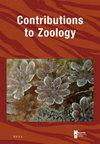The diversity of molluscan faunas in marine lakes of Raja Ampat, West Papua, Indonesia
IF 2.2
2区 生物学
Q1 ZOOLOGY
引用次数: 0
Abstract
Abstract Marine lakes are bodies of seawater that are land-locked and maintain a subterranean connection to the surrounding sea. Here, we document the species diversity of benthic molluscs in 11 marine lakes in Raja Ampat, West Papua, Indonesia, using the roving diving survey method. We specifically tested for relationships between species richness and lake size and the degree of connection to the surrounding sea, and tested potential environmental drivers of community structure. We recorded 73 species, belonging to the classes Gastropoda (48 species, comprising 36 genera and 25 families), Bivalvia (24 species, consisting of 17 genera and 12 families), and Polyplacophora (one species). Molluscs from marine lakes are a subset of species also occurring in coral, seagrass, mangrove, and rocky shore habitats in the open sea. We found lake communities to mostly consist of grazers and filter feeders. The number of mollusc species significantly increased with increasing connection to the surrounding sea, but not with increasing surface area, indicating that dispersal potential may be the main driving force. Furthermore, we observed no significant influence of the environment on the variation in mollusc species composition among marine lakes. Still, we observed certain species to be exclusively present in either high or low-connected lakes, indicating a potential effect of environmental filtering. Marine lakes provide a unique ecosystem for diverse mollusc assemblages and as such should be protected.印度尼西亚西巴布亚省拉贾安帕的海洋湖泊软体动物的多样性
海洋湖泊是被陆地包围并与周围海洋保持地下联系的海水体。本文采用巡游潜水调查方法,对印度尼西亚西巴布亚省拉贾安帕的11个海洋湖泊的底栖软体动物物种多样性进行了记录。我们专门测试了物种丰富度与湖泊大小以及与周围海洋的联系程度之间的关系,并测试了群落结构的潜在环境驱动因素。其中腹足纲48种,隶属于25科36属;双壳纲24种,隶属于12科17属;多placophora目1种。来自海洋湖泊的软体动物是物种的一个子集,也出现在珊瑚,海草,红树林和开阔海域的岩石海岸栖息地。我们发现湖泊群落主要由食草动物和滤食性动物组成。软体动物种类数量随与周围海域联系程度的增加而显著增加,但不随表面积的增加而增加,表明扩散潜力可能是主要驱动力。此外,环境对海洋湖泊软体动物种类组成的影响不显著。尽管如此,我们观察到某些物种只存在于高连接或低连接的湖泊中,这表明环境过滤的潜在影响。海洋湖泊为各种软体动物提供了独特的生态系统,因此应该受到保护。
本文章由计算机程序翻译,如有差异,请以英文原文为准。
求助全文
约1分钟内获得全文
求助全文
来源期刊

Contributions to Zoology
生物-动物学
CiteScore
4.00
自引率
4.50%
发文量
16
审稿时长
>12 weeks
期刊介绍:
Contributions to Zoology solicits high-quality papers in all systematics-related branches of comparative zoology (including paleozoology). Preference will be given to manuscripts dealing with conceptual issues and to integrative papers (e.g., ecology and biodiversity, morphology and phylogeny and character state evolution, phylogeny and historical biogeography, systematics and bioinformatics, bioinformatics and biodiversity, habitat disturbance and biogeography, etc.). Reviews and alpha-taxonomic contributions are considered for publication, but acceptance will depend on their high quality and exceptional nature.
 求助内容:
求助内容: 应助结果提醒方式:
应助结果提醒方式:


